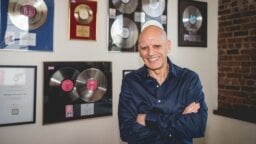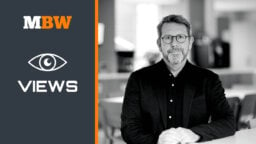Back in 2002, as Peter Leathem contemplated leaving his City law firm job for a new role as head of legal and business affairs at PPL, his wife – also a lawyer – warned him that not everybody in the music industry was necessarily a fan of the collection society.
“There was some annoyance from licensees or members over different things,” he recalls more than two decades on, with him now long-established as the company CEO.
“So, one of the biggest changes in that time is that PPL’s position in the music industry has transformed massively. That’s an indicator of things going in a good direction; we’ve become a well-respected, well-liked organisation that’s central to the music industry.”
Indeed, the modern PPL is not just one of the biggest music companies in Britain, it exists at the beating heart of the UK music industry, as a key member of UK Music and the British Copyright Council. And it’s expanding globally, continuing to sign up big names for international collections, including The Last Dinner Party, Lewis Capaldi and Ice Spice.

This year, it launched PPL Giving, an annual £1 million strategy to give back to UK music by funding initiatives that are driving positive change across the industry. And it’s a rare industry awards ceremony that takes place without PPL’s support.
Leathem himself is a regular presence at such events, often posing for selfies with the stars, some of which adorn the walls of his office in PPL’s central London HQ. He picks a snap with Stormzy at AIM’s Independent Music Awards as his favourite.
“That was the one that went down best with my kids,” he laughs. “Did they think I was cool? I wouldn’t go that far…”
Leathem may have the reassuring demeanour of a senior banking professional, but he has a rock’n’roll soul. In the week he meets MBW, he is attending no fewer than three gigs (“Squeeze, Ezra Collective and Therapy? – an eclectic mix!”) as he continues on his mission to make sure everyone in the industry knows exactly whom PPL are and precisely what they do.
And, even if you haven’t seen him out and about, you’ve probably noticed PPL’s soaring collections. It generated revenues of £283.5m in 2023, the highest in its history – and it’s quite some history: it celebrates its 90th anniversary this year.

Leathem’s 22 years – a dozen of them as CEO after taking over the top job from the legendary Fran Nevrkla in 2012 – may be a mere blip in that lengthy timeframe, but he’s made quite an impression.
In its first 50 years, PPL brought in a total of £69 million for its members. Since Leathem became CEO, collections have totalled more than £2.7 billion. The society now pays out to 90,000 additional performers and record companies, compared to 10 years ago.
Leathem modestly puts most of that down to a changing market, but he’s certainly been involved in some significant moments along the way. In 2006, he was part of the team that brokered the merger with performers’ organisations PAMRA and AURA that greatly increased PPL’s market muscle; while in 2018 he and then-PRS for Music CEO Robert Ashcroft signed up for the public performance joint venture that most people thought they’d never see: PPL-PRS Ltd.
The JV had a difficult start and then had to weather the Covid pandemic, but is now delivering on its financial potential, bringing in £111m to PPL in 2023, up 11% year-on-year. It’s also succeeded in hugely simplifying the licensing process for the nation’s shops, bars, offices, factories, hairdressers, mechanics, and more, meaning Leathem no longer receives a steady flow of letters from MPs asking why their constituents have been asked to pay for two different licenses.
Leathem – awarded an OBE in the 2023 New Year’s Honours list – remains an industry power broker behind the scenes, however. One of the few music industry execs to emerge unscathed from the DCMS Committee inquiry into the economics of streaming, he also seems to be keeping the PPL membership happy, despite the different cohorts often being at odds in recent times.
Indeed, while some collective management organisations (CMOs) around the world are splintered by factionalism and blighted by court cases, the PPL ship seems to be sailing serenely on towards its landmark 100th birthday and beyond. Leathem himself, meanwhile, is “certainly planning on sticking around”.
Time, then, to sit down with the man who puts the PL into PPL and see how he does it…
Why is PPL still here after 90 years?
Well, the importance of the use of music on TV, radio and in public performance has continued and that needs to be licensed. And PPL’s been through a few mergers during that time to get it to where it is. Merging with the performers was a significant step in the journey of the modern PPL; without the performers, you don’t have the same economies of scale or political clout.
“Merging with the performers was a significant step for the modern PPL.”
But, ultimately, PPL has done a good enough job that no one’s felt the need to do something different. The rights-owners could go and set another organisation up, but we’ve done a good job of keeping our stakeholders – the major companies, the independent companies, the featured artists, the non-featured artists and the music producers – all quite happy that we’re doing a good job for them. So that helps sustain the collective spirit for PPL.
Those different groups don’t always agree. How do you keep them all happy?
You need to make sure that you are seen to be listening to everybody, that you don’t just respond to the biggest.
Every now and again, there will be more contentious subjects to deal with, but what we’ve tried to do is be seen as an independent management team doing their best in the circumstances.
That has given us a good bit of ability to push back and explain what we are going to do and what we’re not going to do, and not fall foul of people thinking we’re just trying to look after one interest group. We’ve worked very hard over the years to have that independence, which then helps to manage that stakeholder group on topics that people like to argue about.
Do you stay out of those arguments or get involved?
We actually try to manage it. We’ll meet people outside the boardroom or privately to understand what their views are and push back on things that we think are not very good arguments.
It’s for each interest group to run its own arguments, but we can give a different context and help the different stakeholders out. You try and do a mediation-type process and, if you then become a trusted and respected management team, you’re in a better place to do that and people will listen to you.
We work hard to keep that harmony, so [PPL] doesn’t get split up or people think, ‘I can’t be serviced properly here, I need to have my own organisation’. We’ve avoided that.
You took over as CEO from Fran Nevrkla. Was that a daunting prospect?
It was! When Fran came in in 2000, he could see a lot needed to change – that’s why the industry brought him in. We’d just had Napster and there was a realisation that these so-called secondary rights were going to become really important.
He came in with a clear vision to take PPL forward and changed most of the management team. He was a classic pioneer-agitator, he’d clash things together, but he had good connections to make a change.
I went on that journey with him but still, taking over from someone like Fran is quite daunting. It’s like that whole thing of ‘How do you follow Alex Ferguson?’ – we know the problems that can follow.
So, I was very nervous, actually. It doesn’t take much for something to go wrong in your first year in charge and then people start to go, ‘It’s all gone wrong’. Luckily in my first year, we had a very strong performance financially, so it did seem to move on quite quickly.
Fran stayed on as chair for about four years and, in the same way that Fran and I had worked so well in the years when he was CEO, that transition period also worked really well.
A JV with PRS had been talked about for years, but never happened. How did you get it over the line?
It’s always hard. People tend to look at things like, ‘I’m not sure that will work’. You’ve got self-interest in there, so trying to break through that is hard. And PPL and PRS were not level in terms of their collections; PRS historically were much bigger. PRS used to license 100,000 more sites than PPL did.
So, [in the past] it was much more about PRS wanting to take PPL over, and from PPL’s point of view, it was always thinking, ‘Is that the right thing to do?’
There are a number of outsourcing arrangements in Europe that the record company side or performers’ side have not always felt comfortable with, so we were not keen on an outsourcing arrangement. PRS only wanted to do that, it was getting in the way of trying to come together.
So we really focused on the business, drove the collections and, over time, caught PRS up in terms of our operations. So, by the time Robert Ashcroft came along, I was able to have a more level playing field conversation with him.
Even then, it’s quite hard to make these things happen. It does need a fair bit of diplomacy and negotiation trying to get everybody corralled into the right place. We went to the same premises, for the same use of music and it still took us 84 years to come together!
And then you had to actually make it work…
We’re delighted we did it, it was absolutely the right thing to have done and we’re really seeing the benefits.
But when we launched, we decided to go for a real big bang: go to a brand new city, Leicester, which meant we had mostly new staff, and a new IT system. New building, new city, new name – what could possibly go wrong? Quite a lot!
For all the best preparations, it was a struggle for the management team we’d put in place. That’s when you realise that some of the stuff we do is actually quite complicated! People did struggle with the complexity of it all.
“That’s when you realise that some of the stuff we do is actually quite complicated!”
By the end of 2019, not that we’d cured everything, but we had the best collections for PPL and PRS ever – with brand-new people, brand-new systems. I was thinking, ‘Crikey, this is really positive’. And then, three months later, Covid hit!
How big a challenge was Covid for an organisation built on public performance?
In 2020, we lost £50m of public performance licensing income. That’s a big strain on a business.
PPL furloughed 45 people, we had 250 people up in Leicester and we had to furlough over half of them. At the same time, there was a lot of extra work to try and provide licensing holidays to people – if they’re not there as a business, you can’t really charge them, but we’d never designed our systems or IT to
handle that.
And then we did extra distributions, knowing we still had some money in the system, to support performers who’d lost their livelihoods, not being able to perform. It was an intense time.
The growth in PPL revenues this century has been quite remarkable: did people just not realise its potential before?
Obviously, the value of the market has gone up since then! But previously, it was something that the record companies didn’t give as much focus to, because they were busy selling CDs and doing really well.
Since Fran was brought in, there’s been a lot more work and effort put in to make sure we monetise the rights as well as we can.
If you look at public performance, we only licensed a very small part of the country, so there clearly wasn’t the same level of ambition to invest in that area as we’ve had in more recent years. The level of investment was luckily not done in years gone by, so I could get on and do it!
Annual revenues are now approaching £300m. Is there a ceiling?
No, not necessarily. If you look at the key income streams we’ve got: the broadcast side is going to be harder to grow over the years, because we’re mostly dealing with traditional broadcast.
But, on the public performance side, there’s no reason why we can’t continue. And, internationally, you’ve got a number of growth points. Only around a third of the countries in the world have neighbouring rights for performers and record companies, and that’s increasing.
We’re having more record companies and performers use our international service in a very competitive marketplace. And we’re seeing positives on all those different things.
There are now a lot of players in international neighbouring rights. How do you feel about the competition?
Competition has been really good for performers. When PPL started to do international collections, there were just a few players in the field that were doing some collections, for some performers, on some of their repertoire, in some countries – at a high price!
PPL and others coming in has meant everyone has had to up their game in terms of number of territories, how much repertoire [they represent], what the cost base is…
I’m very happy with the competition that’s in the marketplace, it keeps you focused on providing the best service you can. It’s not providing any impediment to us acting for lots of performers, providing good services and having lots more come to us.
“We’re in a very fortunate position where we don’t need to make a profit.”
We’re in a very fortunate position where we don’t need to make a profit. We’re here to provide a service for the industry at cost and we’re not trying to make a profit on top of it. That drives a certain amount of pressure in the marketplace.
If you’re looking to drive a big return from neighbouring rights, it’s hard. There’s not a big margin there and it’s hard work. I’d imagine over time there will be a thinning out of the market.
Everybody in neighbouring rights says they’re the best, but we’re very confident in what we do, so we’re good at bringing that to life in negotiations to explain why we’re the best option.
Have there been any discussions about a full PPL-PRS merger at some time in the future?
It’s not something that’s been actively discussed. What we’ve been trying to do is look at other areas we can work on together.
We’re doing some trials on digital fingerprinting in public performance venues to see to what extent putting boxes into premises would make a difference to our distributions, or whether what we’re doing with other approaches is good enough.
Whether it gets taken up by mergers in years to come, we’ll have to see, but there’s a role for PPL to play for quite some time. I definitely expect it to be here for another 90 years.
Music Business Worldwide





